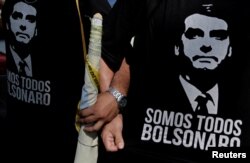With more than 99 percent of votes counted, far-right Brazilian candidate Jair Bolsonaro won the first round of the presidential election with 46 percent of the ballots. The surprising win was not enough, however, to prevent him from avoiding a run-off election on October 28.
Bolsonaro, 63, was the unexpected front-runner going into Sunday's election, and fell just a few points short of winning the 50 percent of votes needed to win the presidency outright.
He is a far-right former Army captain who has praised the country's past military dictatorship and has insulted women and gay people, as well as the country's black and indigenous populations. He once told a female politician that she was too ugly for him to rape and said that he would not be able to love a gay son.
Bolsonaro's views have earned him the nickname of "Tropical Trump," a reference to the controversial U.S. president. He has also promised to crackdown on crime by loosening controls on Brazil's already deadly police forces.
A "step backwards," is how Barbara Aires, a transgender woman described Bolsonaro's victory. She said the politician's win could lead to "taking back rights and more violence toward the LGBT community."
The election in Latin America's largest economy follows the revelation of a huge political corruption scandal in Brazil, one of the largest corruption scandals in Latin American history.
Bolsonaro's closest rival was leftist candidate Fernando Haddad, who has 28 percent of the vote. Haddad is a stand-in for former President Luiz Inacio da Silva, who is jailed and was barred from running.
Although the two men come from different sides of the political spectrum, each ran a campaign based on nostalgia for a return to traditional values and better, simpler times.
"I voted against thievery and corruption,'' Mariana Prado, 54, a human resources expert, told the Associated Press. "I know that everyone promises to end these two things, but I feel Bolsonaro is the only one can help end my anxieties.''
However, Monica de Bolle, director of Latin American Studies at Johns Hopkins University, told AP, "These are the strangest elections I've ever seen. It's shaping up to be a contest between the two weakest candidates possible."







